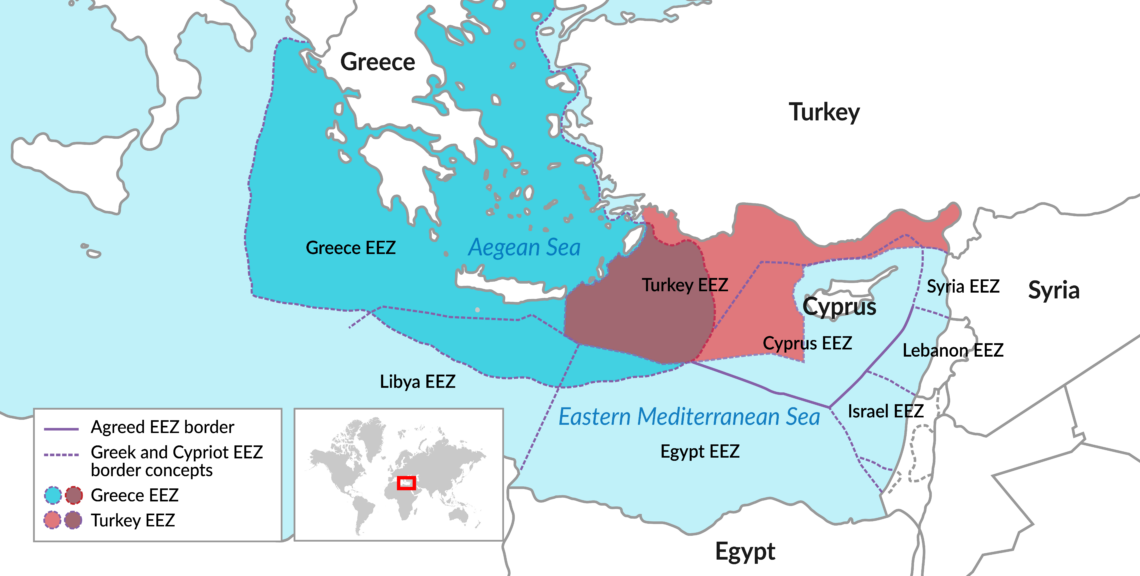Turkey’s complicated position in the Mediterranean Sea
Discoveries of rich hydrocarbon deposits under the Eastern Mediterranean seabed have prompted Greece and Turkey to delineate their own exclusive economic zone. Now, NATO and the European Union have an escalating crisis to defuse.

A Turkish exploration ship has located large deposits of natural gas in the Black Sea. This is good news for Ankara. From the Turkish point of view, the delineation of the coastal countries’ maritime exclusive economic zone (EEZs) there is less contested than in the Aegean Sea and the Eastern Mediterranean.
The leading powers in the Black Sea region are Turkey and Russia. The disputed issues are not Turkey’s problem. In the northern part of the Black Sea, they concern Crimea’s EEZ between Russia and Ukraine, and in the east, Georgia and Russia.
Old rivalries
In geopolitical terms, Ankara is in rivalry with Moscow. Turkey and Russia are pursuing conflicting interests in Syria, the Caucasus, the Balkans and Crimea. Ankara strongly supports Kiev on the Crimea issue. For example, Turkish officials recently signed a “memorandum of cooperation” with Ukraine’s defense industry. Catherine the Great’s 1783 takeover of Crimea from the ethnic Turkic Tatars gave rise to several wars between Turkey and Russia, with Britain and France’s participation. Georgia’s independence is also important to Ankara.
In the Black Sea region today, the danger of the conflict escalating is limited, as both presidents, Recep Tayyip Erdogan and Vladimir Putin, ably practice “realpolitik.” They meet regularly, not because they are such great friends, but to prevent the delicate relationship from deteriorating into a head-on collision.
As the Aegean islands are part of Greece, Athens is claiming almost the entire Aegean Sea, limiting Turkey’s rights to a narrow stretch of waters along its coast.
In the Aegean and Eastern Mediterranean areas, the situation is different. Turkey is the strongest player there, which has led to rivalry with others. There is the protracted Greek-Turkish conflict involving Cyprus. And with recent seabed exploration for gas and oil bringing exciting discoveries, another dimension to the historical rivalry has been added.
Athens has marked out an extensive EEZ in the area. Ankara finds it unjustified, as it drastically limits Turkey’s access to the Aegean Sea. The dispute hinges on how much sea territory an island can claim. As the Aegean islands are part of Greece, Athens is claiming almost the entire Aegean Sea, limiting Turkey’s rights to a narrow stretch of waters along its own coast. Athens has backed up its claims with EEZ agreements with Italy and Egypt.
Cyprus, in the Eastern Mediterranean, has also drawn an EEZ. Turkey disagrees with that claim, too, as the Turkish Republic of Northern Cyprus’s rights are not recognized.
To forward its energy interests (and in response to the other countries’ claims), Turkey signed an EEZ agreement with Libya’s internationally recognized government. Its delineation overlaps other claimed zones. This brings Turkey into the Libyan conflict.
Brewing crisis
Ankara has already had a complicated relationship with the government of President Abdel-Fatah El-Sisi in Egypt and a deteriorating one with Israel. Both these countries now support the Greek and Cypriot positions, respectively.
The navies of both Turkey and Greece are on alert, ready to support their governments’ demands. Even the word “war” is used. France and Italy are strengthening their naval presence in the region to help Greece, and the EU has also given Athens verbal support. There are talks between the leadership of NATO and President Erdogan to try to de-escalate the dispute between the two alliance members. The United Kingdom, while not taking sides, is at pains to mediate in the conflict.
In contrast to the Black Sea situation, the tensions in the Eastern Mediterranean are increasingly driven by emotion. Ankara’s problem is the absence of an obvious counterpart to negotiate a more satisfactory overall solution. At present, Turkey is in a contained position.
